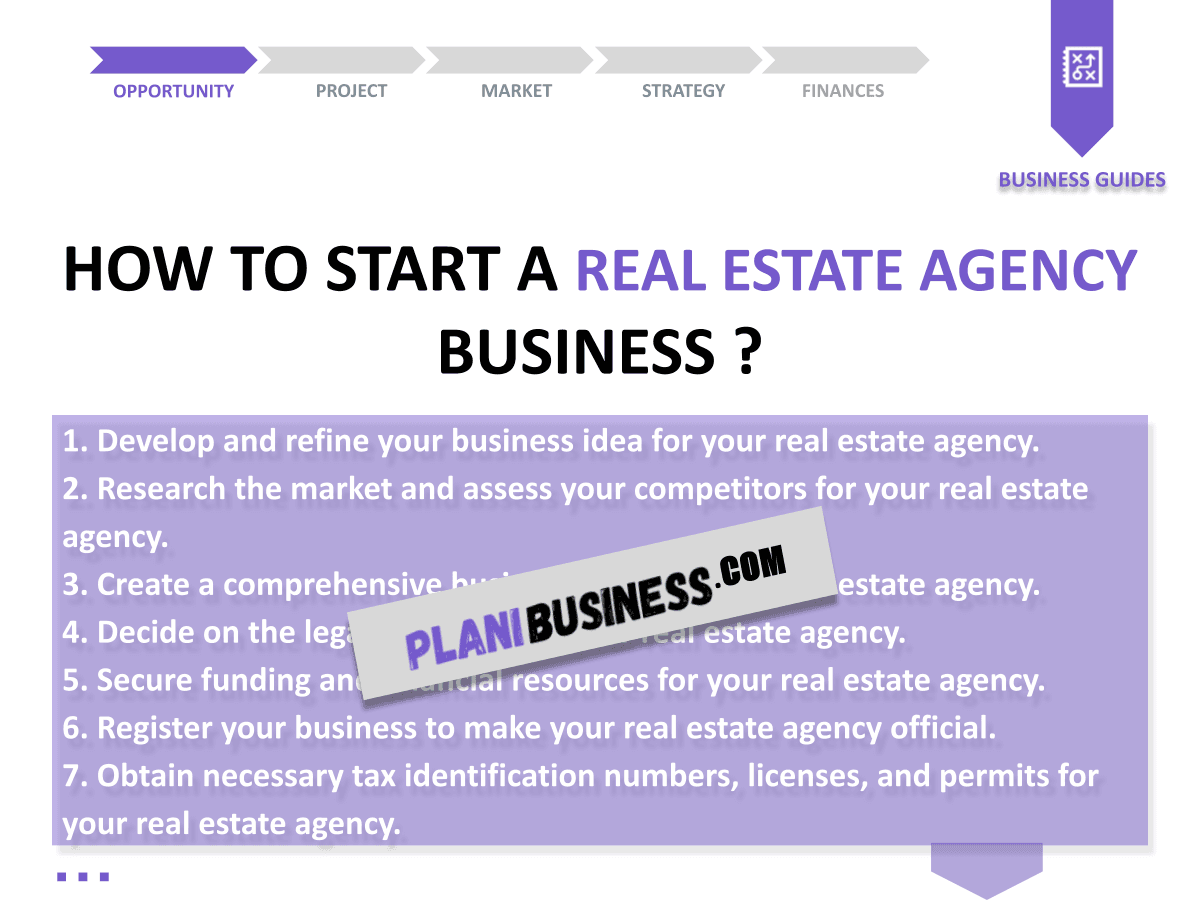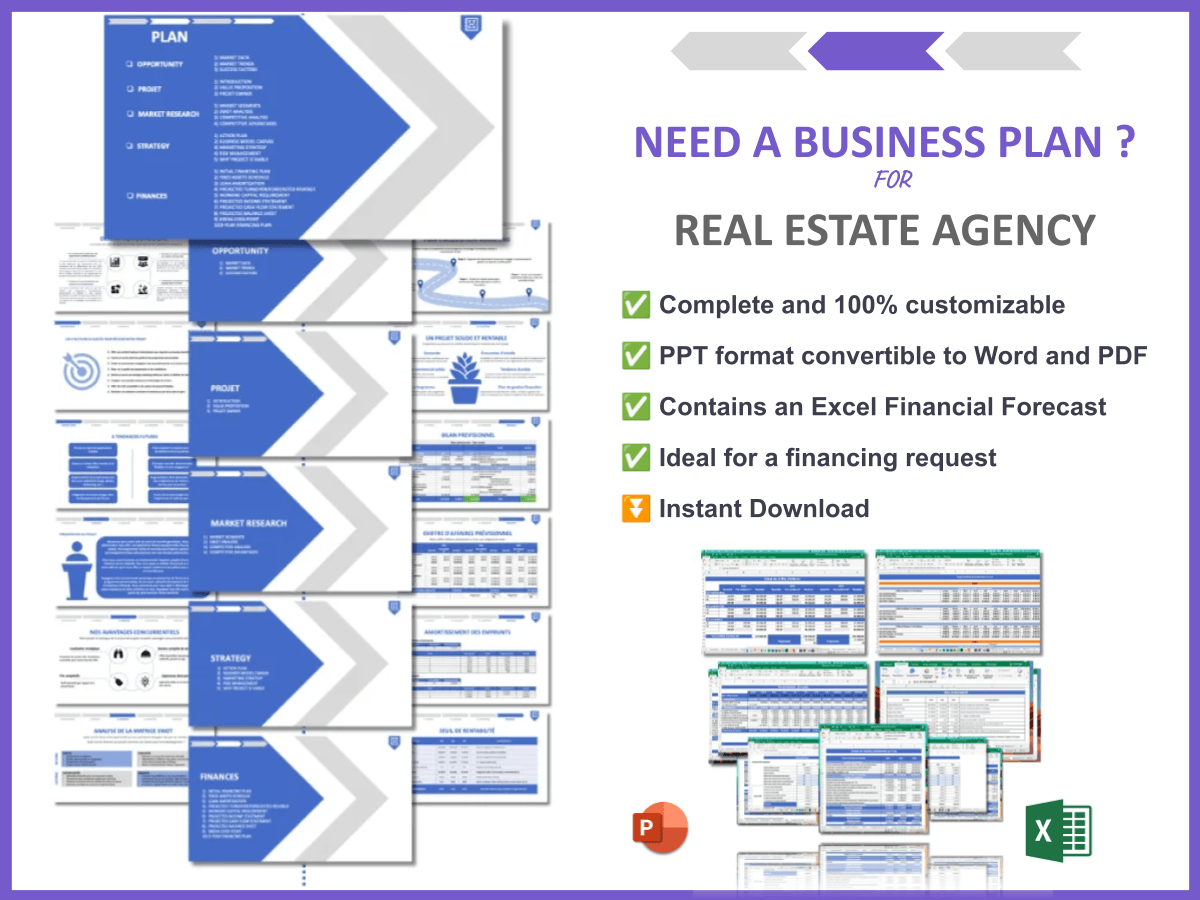Are you thinking about starting a real estate agency? You’re not alone! According to recent statistics, over 2 million people in the United States are licensed real estate agents, which means there’s a thriving market out there for those ready to take the plunge. However, knowing how to start a real estate agency can feel overwhelming. It requires careful planning, market research, and an understanding of the legal landscape. In this article, we’ll walk you through the essential steps to successfully launch your own real estate agency.
In this guide, you will learn:
- The basics of starting a real estate agency
- How to conduct thorough market research
- Creating a comprehensive business plan
- Choosing the right legal structure
- Securing funding for your agency
- Establishing your brand identity and marketing strategies
1. What Are the Basics of Starting a Real Estate Agency?
When it comes to how to start a real estate agency, understanding the basics is crucial. A real estate agency serves as a bridge between buyers and sellers in the property market, and getting the fundamentals right can set you on a path to success. You’ll need to consider factors like your target market, the type of properties you want to deal with, and your overall business goals.
To kick things off, it’s essential to ask yourself:
- What niche in real estate do you want to focus on?
- What are your long-term goals for the agency?
- How do you plan to stand out from competitors?
Additionally, think about your unique selling proposition (USP). This is what differentiates your agency from others and can attract clients who are looking for specific services or expertise.
2. Conducting Market Research for Your Real Estate Agency
Before diving into how to start a real estate agency, you need to conduct thorough market research. This involves assessing the current market conditions, identifying your competitors, and understanding your potential clients’ needs.
Here’s a quick checklist to guide your research:
- Identify local real estate trends, such as average home prices and inventory levels.
- Analyze your competitors’ strengths and weaknesses, including their marketing strategies.
- Conduct surveys or interviews with potential clients to gather insights on their preferences.
Utilizing tools like SWOT analysis can also help you understand where your agency can fit into the market landscape. Here’s a simple table to illustrate:
| SWOT Element | Description |
|---|---|
| Strengths | What advantages does your agency have? |
| Weaknesses | What areas need improvement? |
| Opportunities | What trends can you capitalize on? |
| Threats | What challenges could hinder your success? |
Conducting comprehensive market research will provide you with valuable insights, allowing you to make informed decisions as you embark on your journey to establish a successful real estate agency.
3. Creating a Comprehensive Business Plan
A solid business plan is the backbone of your real estate agency. It outlines your business strategy, financial projections, and marketing plan. A well-crafted business plan not only serves as a roadmap for your agency but also helps attract potential investors and secure financing. I recommend checking out this business plan template for Real Estate Agency. It’s super detailed and can save you a ton of time!
Your business plan should include:
- Executive Summary: A brief overview of your agency, including your mission statement and goals.
- Market Analysis: Insights from your market research, highlighting opportunities and threats in the market.
- Organization and Management Structure: Details on your team, including roles and responsibilities.
- Marketing and Sales Strategy: How you plan to attract and retain clients, including digital marketing tactics.
- Financial Projections: Expected income, expenses, and profitability over the next few years.
Additionally, make sure to revise your plan regularly to adapt to changing market conditions. Keeping it flexible allows you to pivot when necessary and seize new opportunities.
4. Choosing the Right Legal Structure for Your Agency
When figuring out how to start a real estate agency, selecting the right legal structure is essential. You can choose from options like sole proprietorship, partnership, LLC, or corporation. Each has its pros and cons, especially concerning liability and taxation. Understanding these differences can help you make an informed decision that aligns with your goals.
Here’s a quick comparison table:
| Business Structure | Liability | Taxation |
|---|---|---|
| Sole Proprietorship | Unlimited | Personal Income Tax |
| LLC | Limited | Pass-Through Taxation |
| Corporation | Limited | Corporate Tax |
Consulting with a legal expert can help you navigate the complexities of business structures and choose the one that best suits your agency’s needs. Remember, the right legal structure can protect your personal assets and provide credibility to your business.
5. Securing Funding for Your Real Estate Agency
Funding your real estate agency is another crucial step. You might need capital for office space, marketing, and operational costs. Identifying the right funding sources can significantly impact your agency’s ability to launch and grow. Here are some options to consider:
- Personal Savings: Using your savings can help you avoid debt, but ensure you have enough left for personal expenses.
- Bank Loans: Traditional bank loans can provide substantial funding, but they often require a solid business plan and good credit.
- Investors: Bringing in investors can provide the capital you need, but be prepared to share profits and decision-making power.
It’s essential to create a detailed financial projection that outlines how much funding you’ll need and how you plan to use it. A clear financial plan can also help you convince lenders or investors to support your venture.
6. Registering Your Business: Making It Official
Once you’ve set up your business structure and secured funding, it’s time to register your agency. This process involves filing the necessary paperwork with local and state authorities to make your business official. The specific requirements can vary by location, so it’s crucial to check the regulations in your area.
Here’s a checklist of steps to follow when registering your real estate agency:
- Choose a Business Name: Ensure it’s unique and reflects your brand.
- File the Necessary Paperwork: Complete forms required for your chosen business structure.
- Obtain a Business License: Check with your local government for specific licensing requirements.
- Register for Taxes: Apply for an Employer Identification Number (EIN) from the IRS.
Additionally, be sure to check for any specific regulations related to real estate in your area. Compliance with local laws will help you avoid potential fines and legal issues down the line. It’s worth investing time in understanding these requirements, as they are vital for the legitimacy of your agency.
7. Obtaining Necessary Licenses and Permits
In order to operate legally, you’ll need to obtain the necessary licenses and permits for your real estate agency. This usually includes a real estate broker’s license, which can vary by state. Understanding these requirements is essential, as operating without the proper licenses can lead to significant fines and legal trouble.
Here’s a quick list of common licenses and permits you may need:
- Real Estate Broker License: Required to operate a real estate agency and oversee transactions.
- Business License: A general license that allows you to operate a business in your locality.
- Tax Identification Number (TIN): Needed for tax purposes and to hire employees.
It’s also advisable to check with your local real estate board or regulatory agency to ensure you are meeting all legal requirements. Keeping your licenses up to date is crucial for maintaining your agency’s credibility and avoiding any operational disruptions.
8. Setting Up Your Financial Management System
Managing finances is crucial for your agency’s success. Setting up a robust financial management system will help you keep track of income, expenses, and profitability. A well-organized financial system not only aids in budgeting but also prepares you for tax season.
Here are some key components to include in your financial management setup:
- Budgeting: Create a detailed budget that outlines expected revenues and expenses.
- Expense Tracking: Use accounting software to monitor your expenses and identify areas for cost savings.
- Profit Analysis: Regularly assess your profit margins to ensure your agency is on track to meet financial goals.
Consider using popular accounting software options like QuickBooks or FreshBooks to streamline your financial processes. Here’s a simple comparison table of popular accounting tools:
| Software | Best For | Key Features |
|---|---|---|
| QuickBooks | Small to medium-sized businesses | Invoicing, payroll, expense tracking |
| FreshBooks | Freelancers and service-based businesses | Time tracking, project management |
| Xero | Small businesses with multiple users | Multi-currency support, inventory tracking |
Regular financial reviews can help you make informed decisions and adjust your strategy as needed. Keeping your finances in check will set a solid foundation for your real estate agency and contribute to its long-term success.
9. Establishing Your Brand Identity
Your brand identity is what sets you apart in the competitive real estate market. It includes your agency’s name, logo, and overall image. Think about what message you want to convey to your clients. A strong brand identity can build trust and recognition, which is vital for attracting and retaining clients.
Here are some essential elements to consider when establishing your brand:
- Agency Name: Choose a name that reflects your mission and values. Ensure it’s easy to remember and pronounce.
- Logo Design: Invest in a professional logo that visually represents your brand. A good logo should be versatile and work well across various platforms.
- Brand Colors: Select colors that resonate with your target audience. Colors evoke emotions, so choose wisely to convey the right message.
Additionally, consistency across all platforms is crucial. Your website, social media, and printed materials should all reflect your brand identity. Here’s a simple checklist to ensure consistency:
- Use the same logo and color scheme across all platforms.
- Maintain a consistent tone of voice in your communications.
- Regularly update your branding materials to keep them fresh and relevant.
A strong brand identity will help your real estate agency stand out and create a lasting impression in the minds of potential clients.
10. Developing a Professional Website
In today’s digital age, having a professional website is non-negotiable. Your website is often the first point of contact for potential clients. Ensure it’s user-friendly, informative, and visually appealing. A well-designed website can enhance your credibility and help you attract more clients.
Key features to include on your real estate website:
- Property Listings: Showcase current listings with high-quality images and detailed descriptions.
- Contact Information: Make it easy for potential clients to reach you. Include a contact form and your phone number prominently.
- Blog or Resources Section: Provide valuable content that addresses common client questions and showcases your expertise.
Consider optimizing your website for search engines (SEO) to improve visibility. Here’s a quick table of essential SEO elements to focus on:
| SEO Element | Description |
|---|---|
| Keyword Research | Identify relevant keywords that potential clients are searching for. |
| On-Page SEO | Optimize your content, titles, and meta descriptions with targeted keywords. |
| Mobile Optimization | Ensure your website is responsive and easy to navigate on mobile devices. |
Investing in a professional website can significantly enhance your agency’s online presence and help you attract more clients in a competitive market. Remember, your website is often the first impression clients have of your agency, so make it count!
11. Implementing Marketing Strategies
Marketing your real estate agency effectively is vital for attracting clients. Utilize a mix of traditional and digital marketing strategies to reach your audience. The goal is to create awareness and generate leads that convert into clients. Here are some marketing strategies to consider:
- Social Media Marketing: Platforms like Facebook, Instagram, and LinkedIn are great for showcasing properties and engaging with potential clients. Regularly post listings, client testimonials, and market updates.
- Email Campaigns: Create newsletters that provide value to your subscribers. Share market insights, new listings, and tips for buyers and sellers.
- Local Networking Events: Attend community events to connect with potential clients and build relationships. Networking can lead to referrals and partnerships.
It’s important to track your marketing efforts to see what works best for your agency. Consider using tools like Google Analytics to monitor website traffic and engagement. Here’s a simple table of marketing tools that can help you:
| Tool | Purpose |
|---|---|
| Mailchimp | Email marketing campaigns |
| Hootsuite | Social media management |
| Canva | Graphic design for marketing materials |
By implementing a robust marketing strategy, you can significantly increase your visibility and attract more clients to your real estate agency.
12. Assembling Your Real Estate Team
As your agency grows, you may need to hire additional team members. Look for individuals who complement your skills and bring diverse experiences to the table. Building a strong team is essential for scaling your operations and providing excellent service to your clients.
Consider the following roles when assembling your team:
- Real Estate Agents: Hire licensed agents who are knowledgeable about the local market and share your agency’s values.
- Administrative Support: An administrative assistant can help with paperwork, scheduling, and day-to-day operations, allowing you to focus on growing your agency.
- Marketing Specialists: Bringing in a marketing expert can enhance your promotional efforts and help you reach a broader audience.
Creating a positive work culture will help retain top talent. Encourage collaboration, provide training opportunities, and celebrate successes together. Here’s a quick list of tips for building a strong team:
- Set clear expectations and goals.
- Encourage open communication and feedback.
- Recognize and reward hard work and achievements.
Having a dedicated and skilled team will elevate your real estate agency and enhance the overall client experience.
13. Continuously Learning and Adapting
The real estate market is always changing, so staying updated with trends and regulations is crucial. Attend workshops, webinars, and industry events to keep your knowledge fresh. This will not only benefit your agency but also instill confidence in your clients.
Consider joining professional organizations or associations related to real estate, such as the National Association of Realtors (NAR). These organizations often provide valuable resources, networking opportunities, and industry insights.
Here are some strategies for continuous learning:
- Subscribe to Industry Newsletters: Stay informed about market trends and changes in regulations.
- Take Online Courses: Platforms like Coursera and Udemy offer courses on various aspects of real estate and business management.
- Network with Other Professionals: Building relationships with other real estate agents can provide valuable insights and opportunities for collaboration.
Remember, adapting to market changes is key to long-term success in the real estate business. By staying informed and flexible, you can ensure your real estate agency remains competitive and continues to thrive.
Conclusion
Starting a real estate agency can be an exciting and rewarding venture. By following the steps outlined in this guide—from conducting market research to assembling a talented team—you can build a successful agency that meets the needs of your clients. Remember, the key to success lies in careful planning, continuous learning, and adapting to market changes.
To further enhance your journey, consider exploring additional resources. Check out our article on how to create a SWOT Analysis for Real Estate Agency to better understand your agency’s strengths and weaknesses. Additionally, our guide on How to Start a Real Estate Agency Marketing Plan? With Example will provide you with effective strategies to promote your agency and attract clients. Start your journey today and watch your real estate dreams unfold!
FAQ
1. What are the initial steps to start a real estate agency?
To start a real estate agency, you should first develop a business plan, conduct market research, choose a legal structure, and secure the necessary licenses and permits. Understanding the local market and your competition is essential for positioning your agency effectively.
2. How much does it cost to start a real estate agency?
The costs can vary widely depending on factors like location, licensing fees, and marketing expenses. Generally, you should budget for startup costs that may range from a few thousand to tens of thousands of dollars.
3. Do I need a real estate license to start an agency?
Yes, obtaining a real estate broker’s license is typically required to operate a real estate agency. Each state has its own licensing requirements, so it’s important to check your local regulations.
4. What should be included in a real estate agency business plan?
A comprehensive business plan for a real estate agency should include an executive summary, market analysis, organizational structure, marketing strategies, and financial projections. This plan serves as a roadmap for your agency’s success.
5. How can I effectively market my real estate agency?
Utilize a mix of digital and traditional marketing strategies. Consider social media marketing, email campaigns, and networking events. Creating a professional website that showcases your listings is also essential for attracting clients.
6. What legal structure is best for a real estate agency?
The best legal structure depends on your specific needs. Common options include sole proprietorship, LLC, or corporation. An LLC often provides liability protection and is popular among real estate agents.
7. How do I find clients for my real estate agency?
Finding clients can be achieved through various methods such as online marketing, referrals, networking, and hosting open houses. Building a strong brand and reputation will also help attract clients.
8. What technology do I need to run a real estate agency?
Essential technology includes real estate CRM software for client management, accounting software for financial tracking, and a professional website for showcasing listings. Tools for digital marketing and social media management are also beneficial.
9. How can I ensure compliance with real estate regulations?
Stay informed about local and state regulations by joining professional organizations and attending workshops. Regularly review your agency’s practices to ensure they align with current laws and standards.
10. What skills are important for running a successful real estate agency?
Key skills include strong communication, negotiation, and marketing abilities. Understanding market trends and having financial acumen are also crucial for making informed decisions and guiding clients effectively.







